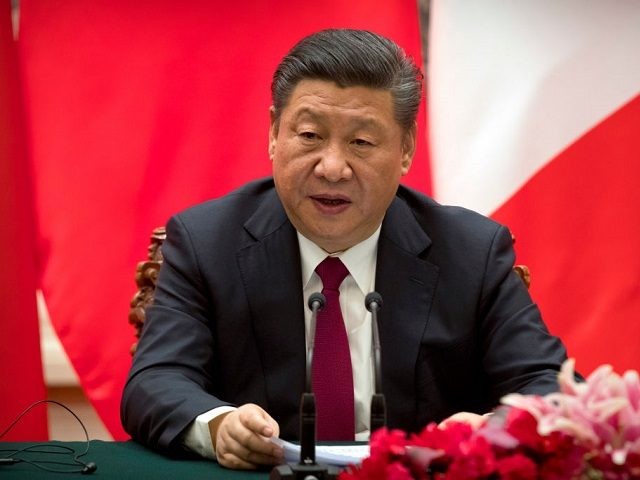Chinese Communist leader Xi Jinping concluded the nation’s annual meeting of its legislature, the National People’s Congress, with an extensive speech on Tuesday warning “separatists”—in reference to Hong Kong, Macau, Taiwan, Tibet, and Xinjiang—that their “actions will be met with the condemnation of the people an the punishment of history.”
“Not a single inch of our land will be, and can be, ceded from China,” Xi declared to applause, an apparent warning also to the United States following the passage of the Taiwan Travel Act in Congress. The act allows Taiwanese officials greater freedom to visit the United States for diplomatic reasons, lending legitimacy to the sovereignty of the Taiwanese government at the expense of China.
While Taiwan governs itself and possesses a fully functional federal government, China considers it a rogue province and its president a separatist criminal. In addressing “separatism” while discussing Hong Kong and Macau, Xi appeared to belie concerns that an emboldened Taiwan will inspire others opposed to totalitarian communist rule to assert themselves against Beijing.
“We will continue to strengthen and foster the national identity and patriotism of people in Hong Kong and Macau and maintain long-term stability,” Xi vowed, asserting that the residents of those regions would govern themselves. He nonetheless emphasized that the “One China” policy, which does not recognize Taiwan’s government is in vigor, and that his regime will “safeguard the sovereignty and territorial integrity of the country and achieve unification of the motherland.”
“This is the aspiration of all Chinese people … any action that aims to separate the country is doomed to fail,” he continued. “These separatist actions will be met with the condemnation of the people an the punishment of history … not a single inch of our land will be, and can be, ceded from China.”
Xi did not specify whether the remark was limited to Taiwan, Hong Kong, and other regions of China fighting to liberate themselves from the Communist Party, including Xinjiang on the nation’s western border and Tibet, home to a thriving Buddhist opposition. China also claims that a sizeable portion of the South China Sea—including land universally accepted to belong to the Philippines, Brunei, Vietnam, Taiwan, and Malaysia—is an “inalienable” part of China, and has illegally colonized that land.
Instead, Xi insisted that China did not seek “hegemony or expansionism” and made a remark some have interpreted as a barb against the Trump administration, which has branded the renegade Xi regime a threat.
“Our development poses no threat to other countries,” Xi said. “Only those who’re given to threatening other people will perceive other people as a threat.”
On domestic issues, Xi insisted on the creation of a “great socialist culture” answerable to himself personally as the core of the Communist Party.
“We will devote more energy and take more concrete measures in developing socialist democracy, upholding the unity of Party leadership, the running of the country by the people, and law-based governance,” Xi announced, warning that the plan to build China into the world’s most powerful country would be akin to “another Long March.”
The “Long March” is the euphemistic name the Chinese government gave Mao Zedong’s retreat north from the battlefield after a defeat by Chiang Kai-Shek’s nationalist forces from 1934-1936, a walk which spanned 6,000 miles and killed an estimated hundreds of thousands.
Xi “pledged to follow the guide of Marxism-Leninism, Mao Zedong Thought, Deng Xiaoping Theory, the Theory of Three Represents, the Scientific Outlook on Development, and the Thought on Socialism with Chinese Characteristics for a New Era” in pursuing this new “Long March,” state-run news outlet Xinhua asserted.
During this year’s National People’s Congress meeting, Xi began his second term as president of China, following a repeal of term limits that would empower him to remain president indefinitely. The congress also enshrined Xi’s name into the nation’s constitution, elevating his status to that of predecessors Mao Zedong and Deng Xiaoping.

COMMENTS
Please let us know if you're having issues with commenting.